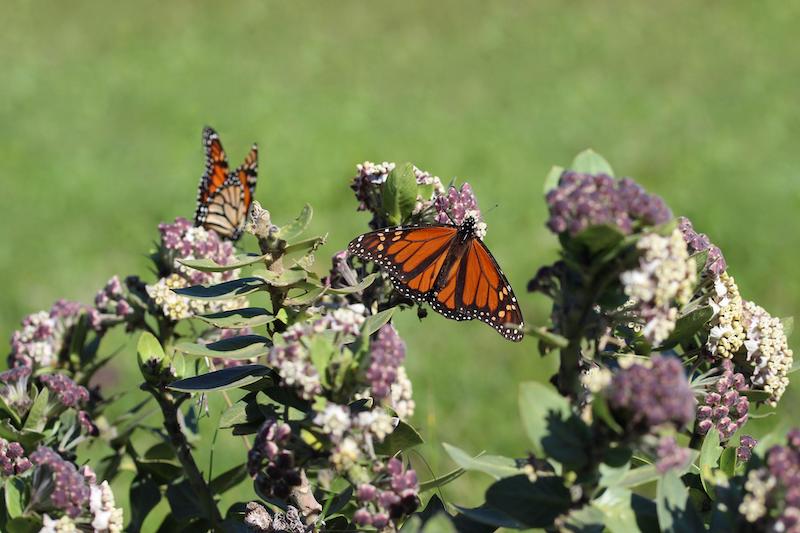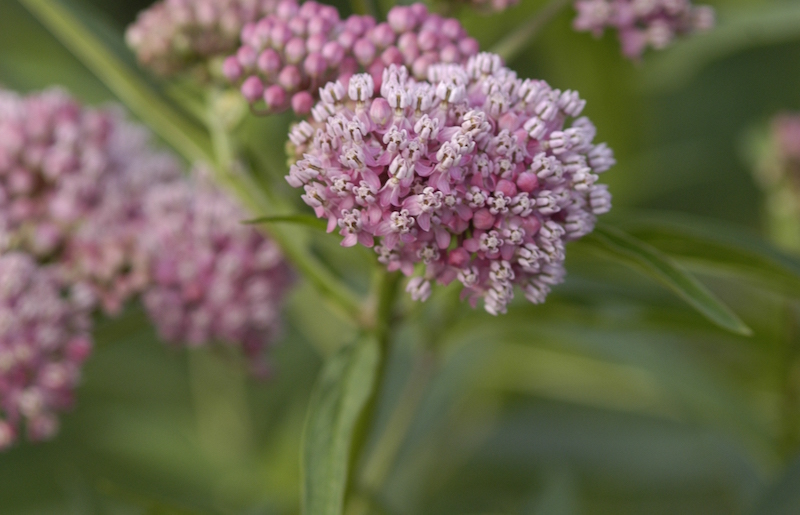Milkweed is a striking flowering perennial that is well loved by butterflies but is poisonous to humans and pets. Small children and pets should always be supervised, especially outdoors, but pay special attention if Milkweed plants are in the area. All parts of Milkweed plants are poisonous, including the leaves, flowers, and stems. Seek immediate medical care if a child, dog, or cat eats any part of a Milkweed plant.

Is Milkweed Poisonous to Children?
Milkweed plants contain cardiac glycosides, which can cause nausea, diarrhea, weakness, and more when eaten. In severe cases, consuming Milkweed can be fatal for children. Even touching Milkweed plants can be a problem and may cause skin irritation. Young children should be supervised when close to Milkweed plants, and it may be worth considering alternative plants when planning an outdoor space.
Is Milkweed Poisonous to Dogs?
Dogs can become very ill and possibly may die if they eat any part of Milkweed plants. It can even be dangerous if your puppy or dog were to eat a caterpillar or butterfly that had recently fed on a Milkweed plant. Milkweed poisoning in dogs includes nausea, vomiting, drooling, abnormal heart rhythm, dilated pupils, and seizures. Seek veterinary care if your dog eats any part of a Milkweed plant.
Is Milkweed Poisonous to Cats?
Milkweed can be fatal if consumed by cats. This flowering perennial is toxic to most animals, including cats and kittens. It is best to get your cat medical care if you suspect your pet has eaten part of a Milkweed plant. Milkweed poisoning in cats includes drooling, vomiting, upset stomach, irregular heart rhythm, dilated pupils, tremors, and seizures.
Is Milkweed Poisonous to Other Animals?
Milkweed is toxic to most animals, including pets and livestock. In addition to cats and dogs, Milkweed is poisonous to horses. Eating Milkweed can be fatal for most animals if large enough quantities are consumed.

Symptoms Of Milkweed Poisoning
While Milkweed has lovely blooms that attract butterflies, this plant can be harmful and potentially fatal for humans and most animals. Milkweed poisoning can cause gastrointestinal distress, irregular heartbeat, seizures, and more. Always check with your doctor or veterinarian for guidance if you suspect Milkweed poisoning.
Here are some common symptoms to look out for:
- Nausea
- Vomiting
- Diarrhea
- Irregular heartbeat
- Dilated pupils
- Tremors
- Seizures
- Skin irritation
Preventing Milkweed Poisoning
Milkweed is an excellent plant to feature in a butterfly garden, but it is toxic to people and most animals, so take care when including Milkweed in a landscape. It is possible to safely feature Milkweed by taking precautions like growing plants out of reach or putting up barriers like fences. Ensuring children and animals cannot get close to Milkweed plants will keep everyone safe and out of harm’s way. Another option is to choose a plant that will attract butterflies and is safe for children, pets, and livestock.
Pet Poison Helpline
If something were to happen to your furry friend, and you suspect that they are suffering from Milkweed poisoning, there is a poison control hotline to call for 24/7 vet advice. It is called the Pet Poison Hotline, and their phone number is (855) 764-7661.
Sources:
"Milkweed Plant Can Cause Serious Poisoning." Poison Control - National Capital Poison Center. poison.org
"Milkweed." American Society for the Prevention of Cruelty to Animals. aspca.org
 |
Author Alison Cotsonas - Published 08-07-2022 |


